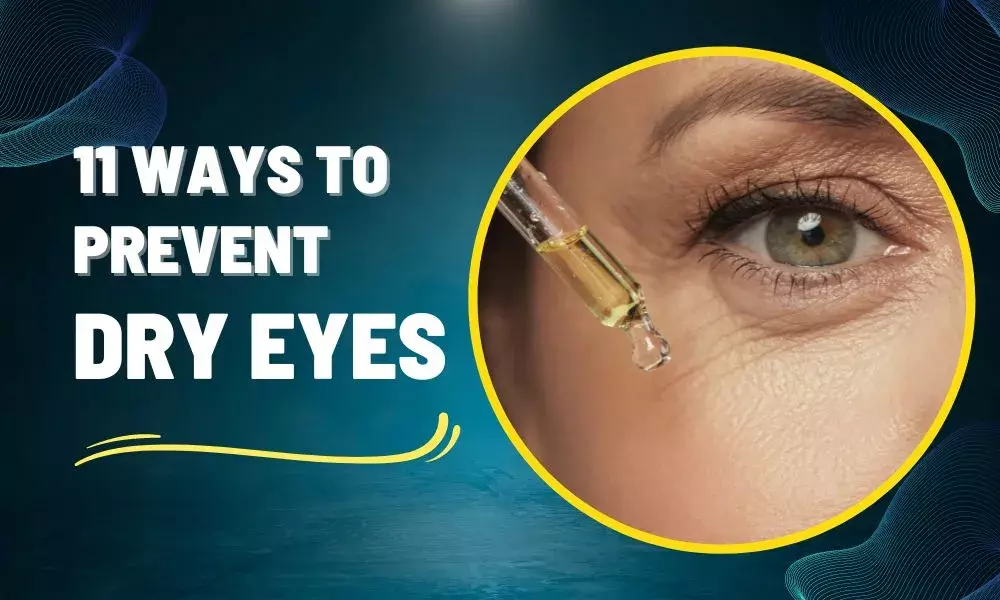With the soaring temperature, there is a rise in health-related issues, especially eye-related issues. It becomes crucial to take care of our eyes. The summer heat may have an adverse impact on our eyes and cause dry eyes.
Our eyes are exposed to sunlight, dry air, air conditions, and blue rays emitted by devices. To prevent any harm to our eyesight, it is crucial to understand what factors may cause dry eyes.
What are Dry eyes:
A dry eye is a condition when the natural lubricant in our eyes is insufficient. Our eyes have a natural lubricant that helps them to function well. This natural lubricant that is present in our eyes is tears.
When the tears evaporate from our eyes or are not produced as per the body’s requirement, “Dry eye” is caused. In the summer, dry eye is a common disease that many people suffer from. It may be highly discomforting, and your eyes may burn.
Symptoms of dry eyes:
-
Discomfort in the eye along with fatigue
-
Frequent swelling with redness
-
Burning and irritation in the eyes
-
Sensitivity to light
-
Vision impairment
-
Excessive tear flow
Nine risk factors for dry eyes:
Certain factors that may cause dry eyes, especially during summer, are:
1. Environmental factors like exposure to sunlight, hot air, wind, and air conditioning can cause dry eyes.
2. Medical conditions like thyroid problems, diabetes, and arthritis can increase your risk of dry eyes.
3. The tear production in our body decreases as we age, making us more vulnerable to dry eyes.
4. Certain medications like antidepressants, decongestants, and antihistamines can increase our risk to dry eyes.
5. Wearing contact lenses for long hours can result in dry eyes.
6. Deficiency of Vitamin B12.
7. Prolonged usage of devices without blinking.
8. Excess exposure to Air Conditions.
9. Exposure to blue screens in a dark room.
Elven ways to prevent dry eyes:
Dry eyes can be discomforting. It is best to avoid such conditions that may lead to dry eyes. You must ensure reasonable care of your eyes and practice below mentioned seven things for keeping dry eye away:
-
Use protective gear: You must wear sunglasses with UV protection whenever you are out in the sun, as it protects your eyes from harmful radiation. Wearing eye gear can protect your eyes from hot air, wind, and dust.
-
Keep yourself hydrated: Staying hydrated can help your eyes generate tears, preventing dry eyes.
-
Use artificial tears: Lubricating your eyes before you go out or spending too much time in an air-conditioned room can help prevent dry eyes. You may consult an ophthalmologist as to which eye drops can be used.
-
Ensure Sufficient Vitamin B12: Vitamin B12 assists in repairing and preserving the corneal nerve layer, which impacts the burning sensation often experienced with dry eye.
-
Include omega-3 fatty acid supplements in your diet: Omega 3 supports tear production. Please consult your doctor before taking supplements since they may interact with some medications. Alternatively, you may also consider natural sources of omega three like oily fish, seafood, flax seed, soybeans, and canola oil.
-
Adjust screen settings: Adjusting the brightness and contrast of digital screens and positioning them to reduce glare can help to reduce eye strain and dryness.
-
Take breaks: When you are reading or using a computer, practice the 20-20-20 rule. That means every 20 minutes, stop and focus your eyes on something 20 feet away for 20 seconds. This will help your eye relax.
-
Manage underlying conditions: Managing underlying conditions such as allergies, rosacea, and autoimmune disorders can help to prevent or minimize dry eyes.
-
Avoid smoking: Smoke can worsen dry eye symptoms. If you smoke, plan to quit smoking in consultation with your doctor. Additionally, avoid passive smoking.
-
Avoid blowing air in your eyes: Ensure no air from devices like hair dryers, car heaters, air conditioners, or fans is directed toward your eyes.
-
Frequent Blinking: Blinking your eye helps to spread a film of tears over the eye. This keeps the eye’s surface clear and smooth. This tear film is essential for good vision and ensures a sufficient supply of tears.
To sum up, dry eyes can be uncomfortable and disruptive, but several strategies can be used to manage and prevent this condition. In the summer, staying hydrated is particularly important, such as wearing sunglasses and using artificial tears to prevent dryness.
Meanwhile, if dry eyes persist or become severe, seeking medical attention to address the underlying cause and receive appropriate treatment is essential. Individuals can enjoy the summer months without discomfort or disruption by taking proactive steps to manage dry eyes.
Data Source: bit.ly/3oIKBcU





